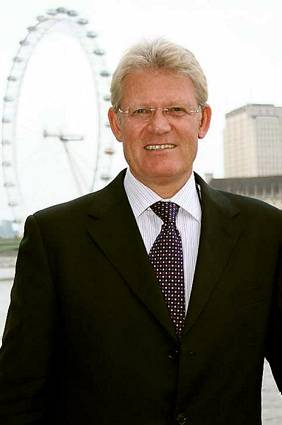Early split in rail link campaign
Reporter: ALAN SALTER Special report
Date published: 29 April 2011

VERY keen . . . Geoff Inskip, chairman of Britain’s Passenger Transport Executive Group
A battle for the hearts and minds of Oldhamers is pitting would-be high-speed travellers and businesses against council taxpayers.
Consultation on the route of the proposed high-speed rail line from Birmingham to Manchester does not begin until next year — but already opponents and supporters from the south are targeting northern destinations.
The Stop High Speed Two campaign claims Oldham will pay £106million towards building the line “at a time when Oldham’s council is facing cuts of £21million to its services this year.”
On the other side of the track, the architect of Oldham’s Metrolink extension who has risen to become the country’s top local transport official, claims that Greater Manchester, Liverpool, Leeds, Sheffield and Birmingham will together become a global force once they are connected by high-speed rail.
Geoff Inskip, chief executive of the West Midlands Centro transport authority, has told Transport Secretary Philip Hammond that it would make sense to start building the line south from Scotland to meet the line from London somewhere in the middle.
Protesters have taken government estimates of a £30billion cost of building the line and its claim that a £17bn subsidy will cost every household £1,000 and multiplied that figure by Oldham’s population.
Jerry Marshall, chairman of the Federation of 75 local and national organisations which oppose the plans, said: “The Government’s proposed new high-speed rail line will be the biggest white elephant in history and will cost every family in the country well over £1,000. Worse still, only those who can afford to pay high fares will benefit.
“At a time of deep public sector cuts in Oldham it is obscene that local people are being asked to subsidise travel for mainly wealthy travellers, with no obvious benefit for local taxpayers.”
Campaigners are urging the Government to invest in improving rail travel for all.
Mr Marshall added: “The Department for Transport is ignoring far more affordable alternatives to high-speed rail which offer much better value for money, would benefit ordinary people, and genuinely tackle the north-south divide without driving a new concrete scar across what’s left of the countryside.”
The Chronicle reported last month on Transport Secretary Philip Hammond’s reaction to the £1,000 per family claim which was first made in a letter from a group of high-profile business leaders, Tory MPs and economists to the Daily Telegraph.
The signatories include former chancellor Lord Lawson; Ruth Lea, former head of policy at the Institute of Directors; Chris Kelly, chairman of Keltruck; Cheryl Gillan, the Welsh Secretary and MP for Chesham and Amersham; and David Lidington, MP for Aylesbury and a Foreign Office minister.
But the Transport Secretary said: “It doesn’t surprise me that people who are truck importers and climate change deniers would find the arguments less than persuasive.”
Meanwhile, Mr Inskip, the new chairman of Britain’s Passenger Transport Executive Group who moved to Centro from Greater Manchester Passenger Transport Executive, in 1996, said: “One of the things I think will happen is that if we can get that link from Manchester/ Liverpool, Leeds/Sheffield, and Birmingham as core cities and you look at their economies and the ability for those to grow, I think you can get that northern/Midlands hub competing on a global scale.”
Mr Inskip was in charge of designing the Metrolink extension to Oldham and Rochdale which will open later this year.
He added: “The one thing that I do think about High Speed Rail is that Birmingham wants to link as much to Manchester and Leeds as it does to London. We are very keen that the ‘Y’ network takes place.”
Oldham Council leader Howard Sykes and his fellow leaders on the Association of Greater Manchester Authorities have welcomed plans.
But Mr Hammond says they need to speak up more.
“They are clearly supportive.
“When you go and speak to them, they are effusive in their support but they are going to have to stir themselves to make the case more aggressively.”
And to those who fear the plans are distracting from the desperate need to spend on the “Northern Hub” to ease rail congestion around Greater Manchester, the Transport Secretary insisted that the two are inextricably linked.
“If somebody had said I’ve got a plan for re-organising our A roads in 1955 and make them operate better — and then announced the coming of the motorways, they would rightly be pilloried if they said: ‘I’ll just carry on with my 1955 plan for reorganising the A roads and I’ll ignore the motorway network.’”
Most Viewed News Stories
- 1The Oldhamers handed awards in King’s New Year’s Honours List
- 2You can score free tickets to a Latics game while supporting Dr Kershaw’s Hospice
- 3Primary school in Uppermill considers introducing new ‘faith-based’ entry criteria to tackle...
- 4Public inquiry announced into rail upgrade that could leave villages ‘cut off’ for months
- 5Tributes paid following death of hugely respected Oldham community figure Dale Harris




